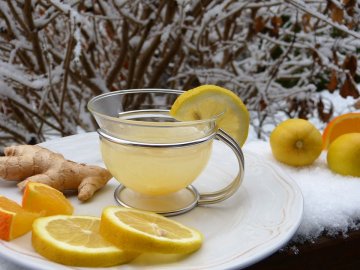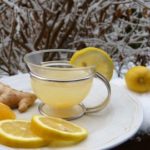
Lemon and ginger tea is a popular home remedy for cold and flu-like symptoms.
Let me make this perfectly clear: I do believe in seeing doctors when we are really sick. But before I visit my doctor I try a few home remedies in case I can save myself the trouble and expense of going to see the local M.D. Modern medicine is based on giving everyone pills. After taking pills for years I finally realized something: we can treat many of the most common ailments with the right foods. In fact, old wives have known that for centuries. So I began researching home-based remedies that are recommended by doctors. See? Even the doctors like these treatment options.
Colds and flus are not serious illnesses for most of us. But if you have trouble breathing or you feel like you have a rock buried in your chest, you should seek medical help because you may have bronchitis or pneumonia. These illnesses can only be treated by antibiotics.
And speaking of antibiotics, there are a couple probably sitting in your cupboard. Did you know that? But let’s get started with the two best-known remedies for colds and flu.
Chicken Soup – Why does everyone recommend chicken soup for colds and flus? There are a couple of good reasons. The first is that any hot liquids you take into your body (they should not be boiling hot) help you feel better and open up your breathing passages. It also helps to breathe the steam from your hot soup before eating it.
In fact, my mother taught me a pretty cool trick. Just get a coffee cup or mug and put hot water in it. Then sit there and breathe the steam for about ten minutes. You’ll feel better for doing so.
But there is another reason why you should eat chicken soup when you have a cold or flu: chicken soup has natural antiviral properties. That means the soup actually kills cold and flu viruses. How great is that? Chicken soup always tastes the best to me when I am really sick, so I keep a few cans in the cupboard for those times when I am not feeling well, usually during the winter and spring months.
Chicken soup is one of the most useful home-based medicines you’ll find in your pantry.
Garlic – You’d never know it, but vampires are not the only bad things that don’t like garlic. Raw garlic is considered to be one of the strongest antibiotic (kills germs) and antiviral medicines in your garden. The benefits of garlic are many but not only does it enhance the flavor of your foods, it enhances your home-remedy treatments. Adding a little bit of garlic to your chicken soup makes sense but you can put garlic into other foods as well. I like to eat the following when I am sick:
- Garlic toast
- Garlic eggs
- Garlic burgers
- Garlic-seasoned stir fry (especially chicken)
- Garlic-seasoned soup (especially chicken soup)
Your wife may not want to kiss you while you are on the garlic diet but I can say from personal experience that it is delicious and helps you feel better.
Learn more about the benefits of garlic on this great blog.
Honey – Honey is one of the most ancient antibiotics nature has ever made. Bees have been making honey for a hundred million years. It works so well because they have refined the formula. But some honeys are not as good for your infections as others. That is because commercial honey growers have sapped the antibiotic potency from their brands in order to make the honey taste sweeter.
Heating honey destroys its antibiotic power, so all creamed or milky honeys are suspect. But the most effective honeys are the dark honeys like Buckwheat Honey, Black Forest Honey, and Manuka Honey from New Zealand. In fact, Manuka Honey is considered to be the world’s most powerful natural antibiotic.
You’ll pay a little more for Manuka honey but it’s well worth having around. If you cannot get Manuke honey then look for Illinois Buckwheat honey.
And the best thing about honey is that it can stay on the shelf for thousands of years. You cannot use honey to treat the common cold and flu but if you develop bronchitis or pneumonia a spoonful of dark honey in the morning and evening will help you feel better.
Remember that honey should not be given to infants and people with type II diabetes should monitor their blood sugar carefully.




